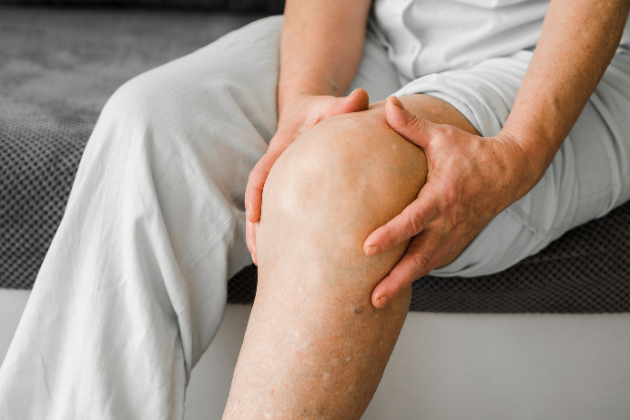
Millions of people throughout the world suffer from osteoarthritis (OA), the most prevalent type of arthritis. It's a degenerative disease that leads to the deterioration of cartilage, the substance that cushions your joints. This disintegration can severely affect your movement and day-to-day functioning and causes excruciating bone grinding. Although OA has no known cure, it is important to manage its symptoms and stop further worsening. This blog examines variables that may exacerbate osteoarthritis symptoms and offers advice on managing your condition.
Before exploring the factors that exacerbate osteoarthritis, let's examine some of its typical symptoms:
This is the classic symptom, which is typically described as a dull soreness or stiffness, particularly in the morning or following periods of inactivity.
It is possible that you will find it difficult to fully expand the range of motion in your joints, especially after waking up or after sitting for long periods of time.
To make matters worse, the afflicted joint may be sensitive to pressure.
Visible swelling surrounding the joint may be caused by inflammation.
You may experience cracking or grinding sounds when you move your bones because of cartilage loss.
Your flexibility may be impacted by Osteoarthritis as it may restrict the range of motion in your joint.
A number of things can exacerbate your osteoarthritis symptoms and cause a flare-up. The following are some major offenders:
Previous injuries, particularly those affecting the joints, might hasten the deterioration of cartilage, resulting in acute discomfort and rigidity.
Sports and jobs that place a lot of stress on the joints, such as certain occupations or sports, might exacerbate symptoms of osteoarthritis.
Weight-bearing joints such as the hips and knees are subjected to additional strain when an individual weighs too much. Even a small weight loss can have a big impact on easing the symptoms of osteoarthritis and reducing joint tension.
The inability of weak surrounding muscles to support the joint properly causes tension, which exacerbates the symptoms of osteoarthritis.
Even though it's crucial to rest during flare-ups, staying inactive for an extended period of time might cause joint and muscular pain.
There are some foods that can aggravate inflammation. Joint health requires a diet high in fruits, vegetables, whole grains and balance that includes these vital elements. Cutting less on added sweets, bad fats and processed foods may be helpful.
Smoking reduces blood supply to the joints, which slows down the healing process and may hasten the deterioration of cartilage.
Though the precise cause is still unknown, some OA sufferers report feeling more pain and stiffness in cold or wet conditions.
Prolonged stress can worsen the symptoms of osteoarthritis by increasing the sense of pain and tensing up muscles. Yoga and other relaxation methods, such as deep breathing, can be beneficial.
After learning the typical offenders, consider these tactics to manage the symptoms of osteoarthritis:
Articulation health can be greatly enhanced by even small weight reduction.
Take part in low-impact activities to increase joint flexibility and muscular strength.
When it comes to supporting joint health, give priority to fruits, vegetables, whole grains and lean protein. Restrict your intake of added sweets, bad fats and processed foods.
Reduce tension and enhance your experience of pain by engaging in relaxation exercises like yoga, meditation or deep breathing.
Flexibility can be increased and discomfort can be reduced by applying hot packs to tense joints in the morning. On the other hand, following a flare-up, ice packs can be useful for lowering inflammation.
Many people look for alternative treatments to manage their symptoms, even though physical therapy, pain medication and, in extreme circumstances, surgery, are common established treatments for osteoarthritis. Herbal supplements, such as Jamna Herbal's Rasraj Kalp Tablet (Swarn Yukt), may help maintain joint health and lessen the symptoms of osteoarthritis.
With powerful herbs and natural ingredients like Ashwagandha, Guggulu, Rasraj Ras (Swarn Yukta), Ras Sindoor, Shuddh Vatsnabh and Bhawna Dravya: Kakmachi, Arjun and Bala, known for their anti-inflammatory, analgesic and revitalising effects, Rasraj Kalp (Swarn Yukta), the osteoarthritis tablet is a powerful Ayurvedic formulation.
Several essential elements found in Jamna Herbal's Rasraj Kalp Tablet (Swarn Yukt) are traditionally used in Ayurvedic medicine to treat symptoms of neuromuscular disorders, dizziness and other illnesses, as well as osteoarthritis and other Vataj diseases. Together, these components of Rasraj Kalp Tablet reduce the symptoms of osteoarthritis, support joint health and improve general well-being.
Osteoarthritis is a chronic ailment that needs to be managed proactively in order to reduce symptoms and enhance quality of life. People can improve their joint health by adopting more educated lifestyle choices by being aware of the things that can exacerbate osteoarthritis (OA), such as being overweight, not exercising, having bad posture and eating poorly.